In addition to the open-access series New Directions in Palestinian Studies, UC Press publishes numerous books that contribute to globalizing knowledge about Palestine’s history. This reading list is intended to enrich and expand discussions around the people and the place but is not exhaustive. You can discover more scholarship on Palestine at ucpress.edu.
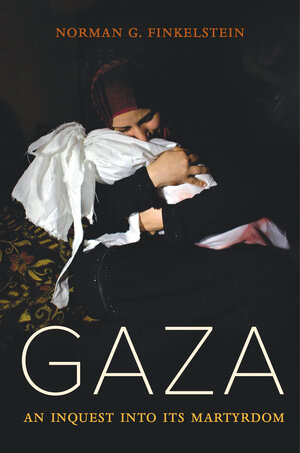
Gaza: An Inquest into Its Martyrdom
By Norman Finkelstein
“No one who ventures an opinion on Gaza . . . is entitled to do so without taking into account the evidence in this book.” —Jeremy Scahill, The Intercept
“In its comprehensive sweep, deep probing and acute critical analysis, Finkelstein’s study stands alone.”—Noam Chomsky
What has befallen Gaza is a man-made humanitarian disaster. Based on scores of human rights reports, Norman G. Finkelstein’s presents a meticulously researched inquest into Gaza’s martyrdom. He shows that although Israel has justified its assaults in the name of self-defense, in fact these actions constituted flagrant violations of international law. But Finkelstein also documents that the guardians of international law—from Amnesty International and Human Rights Watch to the UN Human Rights Council—ultimately failed Gaza.
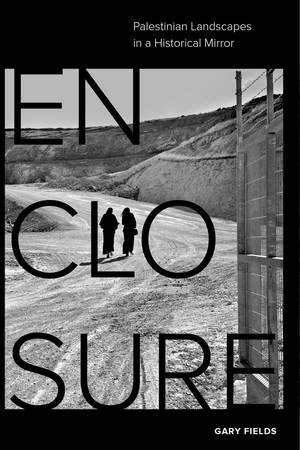
Enclosure: Palestinian Landscapes in a Historical Mirror
By Gary Fields
“Reading Enclosure brings home the tragedy of such immense and irrevocable destruction.”—New York Review of Books
“A masterful study of how landscapes come into being.”—Lisa Hajjar, author of The War in Court Inside the Long Fight against Torture
Enclosure marshals bold new arguments about the nature of the conflict in Israel/Palestine. Gary Fields examines the dispossession of Palestinians from their land—and Israel’s rationale for seizing control of Palestinian land—in the contexts of a broad historical analysis of power and space and of an enduring discourse about land improvement. Focusing on the English enclosures (which eradicated access to common land across the English countryside), Amerindian dispossession in colonial America, and Palestinian land loss, Fields shows how exclusionary landscapes have emerged across time and geography. Evidence that the same moral, legal, and cartographic arguments were used by enclosers of land in very different historical environments challenges Israel’s current claim that it is uniquely beleaguered. This comparative framework also helps readers in the United States and the United Kingdom understand the Israeli/Palestinian conflict in the context of their own histories.
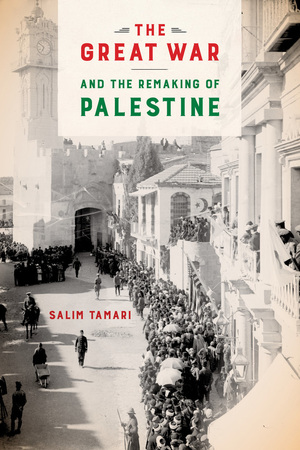
The Great War and the Remaking of Palestine
By Salim Tamari
“This seminal collection of essays makes a major contribution and is a perfect capstone for Tamari’s groundbreaking and must-read trilogy on Palestinian social history.”—Mark LeVine, author of Heavy Metal Islam
This rich history of Palestine in the last decade of the Ottoman Empire reveals the nation emerging as a cultural entity engaged in a vibrant intellectual, political, and social exchange of ideas and initiatives. Employing nuanced ethnography, rare autobiographies, and unpublished maps and photos, The Great War and the Remaking of Palestine discerns a self-consciously modern and secular Palestinian public sphere. New urban sensibilities, schools, monuments, public parks, railways, and roads catalyzed by the Great War and described in detail by Salim Tamari show a world that challenges the politically driven denial of the existence of Palestine as a geographic, cultural, political, and economic space.
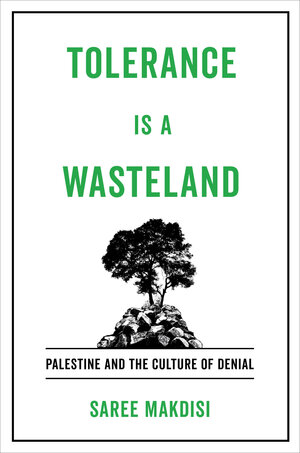
Tolerance Is a Wasteland: Palestine and the Culture of Denial
By Saree Makdisi
“This book is a beacon of light, and we can only hope that it shines and shines.”—Judith Butler, author of Precarious Life and The Force of Nonviolence
Tolerance Is a Wasteland argues that the key to this miraculous act of political alchemy is a very specific form of denial. Here the Palestinian presence in, and claim to, Palestine is not simply refused or covered up, but negated in such a way that the act of denial is itself denied. The effects of destruction and repression are reframed, inverted into affirmations of liberal virtues that can be passionately championed. In Tolerance Is a Wasteland, Saree Makdisi explores many such acts of affirmation and denial in a range of venues: from the haunted landscape of thickly planted forests covering the ruins of Palestinian villages forcibly depopulated in 1948; to the theater of “pinkwashing” as Israel presents itself to the world as a gay-friendly haven of cultural inclusion; to the so-called Museum of Tolerance being built on top of the ruins of a Muslim cemetery in Jerusalem, which was methodically desecrated in order to clear the space for this monument to “human dignity.” Tolerance Is a Wasteland reveals the system of emotional investments and curated perceptions that makes this massive project of cognitive dissonance possible.
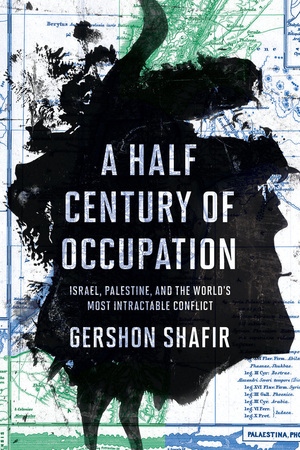
A Half Century of Occupation: Israel, Palestine, and the World’s Most Intractable Conflict
By Gershon Shafir
“Shafir deserves credit for exploring how Palestinians and Israelis can find a path to achieve peace, equality, and justice.”—H-Net
“An honest and informative critique of the 1967 occupation.”—The Middle East Journal
The Israel-Palestine conflict is one of the world’s most polarizing confrontations. Its current phase, Israel’s “temporary” occupation of the West Bank, Gaza, and East Jerusalem, turned a half century old in June 2017. In these timely and provocative essays, Gershon Shafir asks three questions—What is the occupation, why has it lasted so long, and how has it transformed the Israeli-Palestinian conflict? His cogent answers illuminate how we got here, what here is, and where we are likely to go. Shafir expertly demonstrates that at its fiftieth year, the occupation is riven with paradoxes, legal inconsistencies, and conflicting interests that weaken the occupiers’ hold and leave the occupation itself vulnerable to challenge.
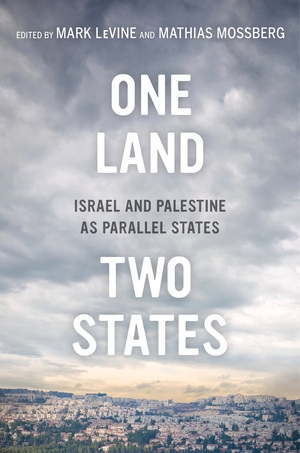
One Land, Two States: Israel and Palestine as Parallel States
Edited by Mark LeVine and Mathias Mossberg
“It is evident that the editors put considerable thought into seeking a fine balance between Israeli and Palestinian scholars—and this is done quite artfully.”—Israel Journal of Foreign Affairs
Leading Palestinian and Israeli experts along with international diplomats and scholars answer this timely question by examining a scenario with two parallel state structures, both covering the whole territory between the Mediterranean and the Jordan River, allowing for shared rather than competing claims of sovereignty. Such a political architecture would radically transform the nature and stakes of the Israel-Palestine conflict, open up for Israelis to remain in the West Bank and maintain their security position, enable Palestinians to settle in all of historic Palestine, and transform Jerusalem into a capital for both of full equality and independence—all without disturbing the demographic balance of each state. Exploring themes of security, resistance, diaspora, globalism, and religion, as well as forms of political and economic power that are not dependent on claims of exclusive territorial sovereignty, this pioneering book offers new ideas for the resolution of conflicts worldwide.
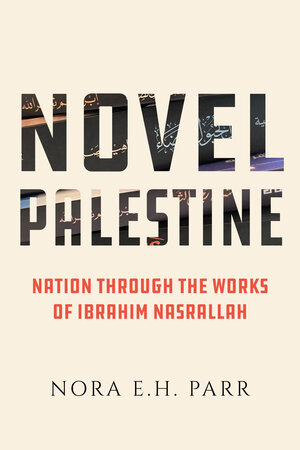
Novel Palestine: Nation through the Works of Ibrahim Nasrallah
By Nora E.H. Parr
“A timely and significant intervention in our understanding of the Palestinian novel and identity. A must read for everyone interested in Palestine, identity, and literature.”—Wen-chin Ouyang, author of Politics of Nostalgia in the Arabic Novel
Palestinian writing imagines the nation, not as a nation-in-waiting but as a living, changing structure that joins people, place, and time into a distinct set of formations. Novel Palestine examines these imaginative structures so that we might move beyond the idea of an incomplete or fragmented reality and speak frankly about the nation that exists and the freedom it seeks. Engaging the writings of Ibrahim Nasrallah, Nora E. H. Parr traces a vocabulary through which Palestine can be discussed as a changing and flexible national network linking people across and within space, time, and community. Through an exploration of the Palestinian literary scene subsequent to its canonical writers, Parr makes the life and work of Nasrallah available to an English-language audience for the first time, offering an intervention in geography while bringing literary theory into conversation with politics and history.
A free e-book is available for this Open Access title, which is part of New Directions in Palestinian Studies.
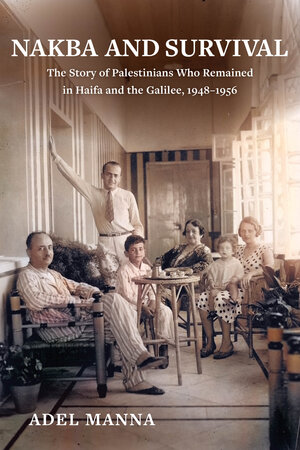
Nakba and Survival: The Story of Palestinians Who Remained in Haifa and the Galilee, 1948-1956
By Adel Manna
“This is a meticulously researched, beautifully written account of Palestinians who fought tenaciously to remain in their homeland—Maha Nassar, author of Brothers Apart
Beginning in 1948, Israeli paramilitary forces began violently displacing Palestinian Arabs from Palestine. Nakba and Survival tells the stories of Palestinians in Haifa and the Galilee during, and in the decade after, mass dispossession. Manna uses oral histories and Palestinian and Israeli archives, diaries, and memories to meticulously reconstruct the social history of the Palestinians who remained and returned to become Israeli citizens. This book focuses in particular on the Galilee, using the story of Manna’s own family and their village Majd al-Krum after the establishment of Israel to shed light on the cruelties faced by survivors of the military regime. While scholars of the Palestinian national movement have often studied Palestinian resistance to Israel as related to the armed struggle and the cultural struggle against the Jewish state, Manna shows that remaining in Israel under the brutality of occupation and fighting to return to Palestinian communities after displacement are acts of heroism in their own right.
A free e-book is available for this Open Access title, which is part of New Directions in Palestinian Studies.

Camera Palaestina: Photography and Displaced Histories of Palestine
By Issam Nassar (Author), Stephen Sheehi (Author), Salim Tamari
“A rich visual chronicle of Palestinian social and political life in the late Ottoman and British Mandate period and a granular account of the history of photography in Palestine.”—Rebecca L. Stein, author of Screen Shots
Camera Palaestina is a critical exploration of Jerusalemite chronicler Wasif Jawhariyyeh (1904–1972) and his seven photography albums entitled The Illustrated History of Palestine. Jawhariyyeh’s nine hundred images narrate the rich cultural and political milieu of Ottoman and Mandate Palestine. Nassar, Sheehi, and Tamari locate this archive at the juncture between the history of photography in the Arab world and the social history of Palestine. Shedding new light on this foundational period, the authors explore not just major historical events and the development of an urban bourgeois lifestyle but a social field of vision of Palestinian life as exemplified in the Jerusalem community. Tracking the interplay between photographic images, the authors offer evidence of the unbroken field of material, historical, and collective experience from the living past to the living present of Arab Palestine.
A free e-book is available for this Open Access title, which is part of New Directions in Palestinian Studies.
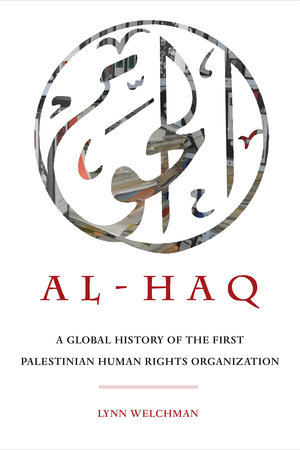
Al-Haq: A Global History of the First Palestinian Human Rights Organization
By Lynn Welchman
“Clear, concise, accessible, and detailed. Offers original material on the development of the human rights movement in Palestine and globally.”—Mouin Rabbani, coeditor of Jadaliyya
Established in Ramallah in 1979, al-Haq was the first Palestinian human rights organization and one of the first such organizations in the Arab world. This inside history explores how al-Haq initiated methodologies in law and practice that were ahead of its time and that proved foundational for many strands of today’s human rights work in Palestine and elsewhere. Lynn Welchman looks at both al-Haq’s history and legacy to explore such questions as: Why would one set up a human rights organization under military occupation? How would one go about promoting the rule of law in a Palestinian society deleteriously served by the law and with every reason to distrust those charged with implementing its protections? How would one work to educate overseas allies and activate international law in defense of Palestinian rights? This revelatory story speaks to the practice of local human rights organizations and their impact on international groups.
A free e-book is available for this Open Access title, which is part of New Directions in Palestinian Studies.
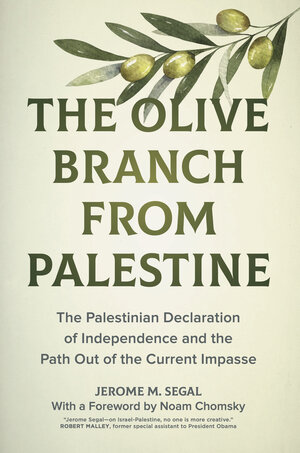
The Olive Branch from Palestine: The Palestinian Declaration of Independence and the Path Out of the Current Impasse
By Jerome M. Segal (Author), Noam Chomsky (Foreword)
“Segal’s carefully argued and highly informative study is centered on an original strategy that he had devised, a strategy implemented by Palestinian leadership but only partially, so that its feasibility remains untested.”—Noam Chomsky
The Olive Branch from Palestine provides a new narrative of the Palestinian effort to end the Israeli-Palestinian conflict and offers a bold plan for ending this conflict today, a proposal that focuses on Palestinian agency and the power of the Palestinians to bring about the two-state solution, even in the absence of a fully committed Israeli partner.
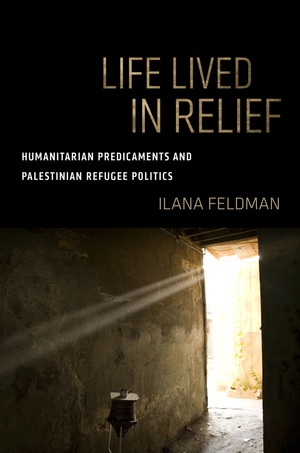
Life Lived in Relief: Humanitarian Predicaments and Palestinian Refugee Politics
By Ilana Feldman
Palestinian refugees’ experience of protracted displacement is among the lengthiest in history. In her breathtaking new book, Ilana Feldman explores this community’s engagement with humanitarian assistance over a seventy-year period and their persistent efforts to alter their present and future conditions. Based on extensive archival and ethnographic field research, Life Lived in Relief offers a comprehensive account of the Palestinian refugee experience living with humanitarian assistance in many spaces and across multiple generations. By exploring the complex world constituted through humanitarianism, and how that world is experienced by the many people who inhabit it, Feldman asks pressing questions about what it means for a temporary status to become chronic. How do people in these conditions assert the value of their lives? What does the Palestinian situation tell us about the world? Life Lived in Relief is essential reading for anyone interested in the history and practice of humanitarianism today.